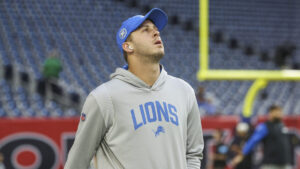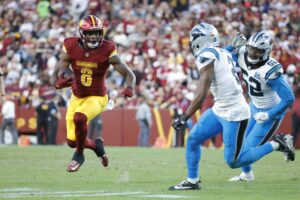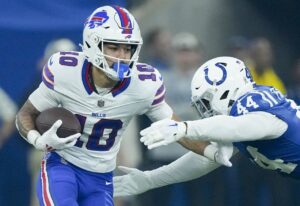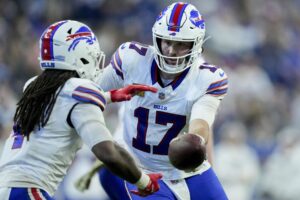Amidst the commotion of the pre-draft process and the NFL Combine, an interesting name arose in the NFL news this week. According to a tweet from Eugene Frenette, a columnist for the Florida Times-Union, the Jacksonville Jaguars and New England Patriots have shown interest in trading Baltimore Ravens tight end Hayden Hurst. The 2018 first-round pick is allegedly searching for a larger role as he is currently in a crowded, but elite, group in Baltimore.
Patriots, Jaguars exploring pre-draft trade for @Ravens TE Hayden Hurst, but whether it happens will depend on what draft capital teams r willing to part with. Hurst, who Jags we’re going to draft in 2018 ,told me 2 months ago he wants opportunity to catch more passes. Stay tuned
— Eugene Frenette (@GeneFrenette) February 24, 2020
Hurst is perhaps best known for being the first of two Baltimore selections in the first round of the 2018 draft. The player selected prior to him is reigning league MVP, Lamar Jackson. Since being selected, Hurst has become a valuable cog in the Ravens offense — perhaps most so this past season. One of the biggest reasons for Jackson’s impressive season was the improved play from his tight end group. The unit of Hurst, Mark Andrews and Nick Boyle caught a league-leading 14 touchdowns and hauled in a whopping 125 balls for 1,522 yards — all on top of their blocking responsibilities.
Though it may seem like the Ravens have a surplus of talent at the position, all the tight ends complement each other in different ways. Andrews is the receiving threat, Boyle is the blocker and Hurst does a bit of both. Therefore, their production is largely reliant on the other two doing their jobs. It’s hard to see Hurst being moved but general manager Eric DeCosta made a number of tough calls last off-season that panned out extremely well. If he believes trading Hurst is the best move for the team then it’s easy to see him pulling the trigger.
After the most explosive offensive season in Ravens history, breaking up the trio doesn’t seem right and neither does trading Hayden Hurst.
Baltimore Ravens Should Not Trade Hayden Hurst
The Importance of Hurst’s Current Role
Since being selected by the Ravens in 2018, Hayden Hurst has seen a decent workload over his first two years. He’s played 28 games (30 including playoffs) and has amassed 732 total snaps played for an average of just over 26 per game. His workload from year-one to year-two also nearly doubled in almost every key area. Hurst’s receptions jumped from 13 to 30, receiving yards from 163 to 349, and touchdowns from one to two. He’s also showed the ability to be a valuable piece in the run game as a blocker.
However, where his numbers pale in comparison is to his other two positional teammates. Andrews led the Ravens in catches, receiving yards and touchdowns while Boyle led the tight end group in snaps by a wide margin. Andrews is also three years younger than Hurst. Hurst had his moments in 2019, perhaps most significantly the game-deciding touchdown on a 61-yard deep ball Week 14 against the Buffalo Bills, but didn’t have the game-in-game-out impact that Andrews or Boyle had. He played a career-high 57% of snaps in two games where the starters were off the field in the fourth quarter and recorded over 40 yards in just two games all season.
Where Hurst gains bonus points is his ability to be on the field. Andrews played through injury a few times but if he or Boyle were to get hurt at any point during the year, Hurst can fill either spot. He has played every game since missing the first four of his rookie season. It’s also important to remember he’s still young in terms of seasons played. The flexibility and durability Hurst has displayed in his first two years in Baltimore makes him a very important piece of their offense despite lacking elite production numbers.
Return for Ravens Would Need to Be Perfect
The biggest roadblock in a potential trade for Hayden Hurst would be the return for the Ravens. His mix of importance to the team and cap hit are both huge qualities to the current Ravens team. According to Jeff Zrebiec, teams have been inquiring about Hurst since before the tradeline.
Teams have been acquiring about him since before trade deadline. That's part of it.
— Jeff Zrebiec (@jeffzrebiec) February 24, 2020
While Hurst’s age may be a factor in why a team would not value him as much, it has no bearing on the Ravens. He has two years, plus a fifth-year option, left on his rookie contract and will cost very little on the cap if he is kept over the next three years.
If a deal were to be reached between the Ravens and another team, the floor for the return would likely be a second-round pick and maybe even a bit more. Hurst has two years of NFL experience, ideal size at his position, is well versed as a pass catcher and blocker, and a contract that is projected to take up less than 2.0% of a team’s cap over the next three seasons. Any team could use a player like that. There’s also a chance that Hurst could bring back a compensatory pick as high as the third round if he were to leave via free agency at the end of his rookie deal. The return would likely need to be a pick/player with good value that the Ravens believe can make an impact as soon as this upcoming season.
Replacing Hurst would be complicated and it’s hard to believe that DeCosta would ship him for a modest return.
Finding a Replacement Would Be Tricky
If the Ravens were to trade Hurst, they would need to have a backup plan in order to keep maybe their best position group elite again in 2020. That looks like a tough task as of now.
Finding a tight end on the open market would almost certainly cost the Ravens more than Hurst. His cap hit doesn’t exceed over $3.6 million during the next two seasons. The tight end class in free agency is very top-heavy and paying one of the best options is completely out of the question with Andrews and Boyle still under contract for two more seasons. Using a bargain-bin fill-in would likely be a significant downgrade.
Finding a tight end in the draft could even be more problematic. The 2020 class is maybe the weakest of any position in the entire draft and a tight end might not even be taken within the top-50 picks. Even if the Ravens were to grab a tight end in the later rounds, while he may be younger than Hurst, that prospect would likely need a decent amount of time to develop into an impact player. A rookie contract for a player taken outside of the first round only carries four years — just one more than Hurst’s current deal.
The solution would likely have to be a mix of developing a young player while signing depth options for the next couple of years with potentially higher cap hits than Hurst. This would cost an extra roster spot as well. There simply isn’t a quick fix for losing Hurst.
Should the Ravens Trade Hurst?
No — unless the value is overwhelming. DeCosta has put a lot of time into shaping the Ravens and simply shipping what many teams view as a ‘depth option’ for mid-round picks makes no sense. The Ravens are a young team in win-now mode with a chance to be special over the next few seasons. If DeCosta is making deals they have to have proper merit.
Main Photo:
Embed from Getty Images






